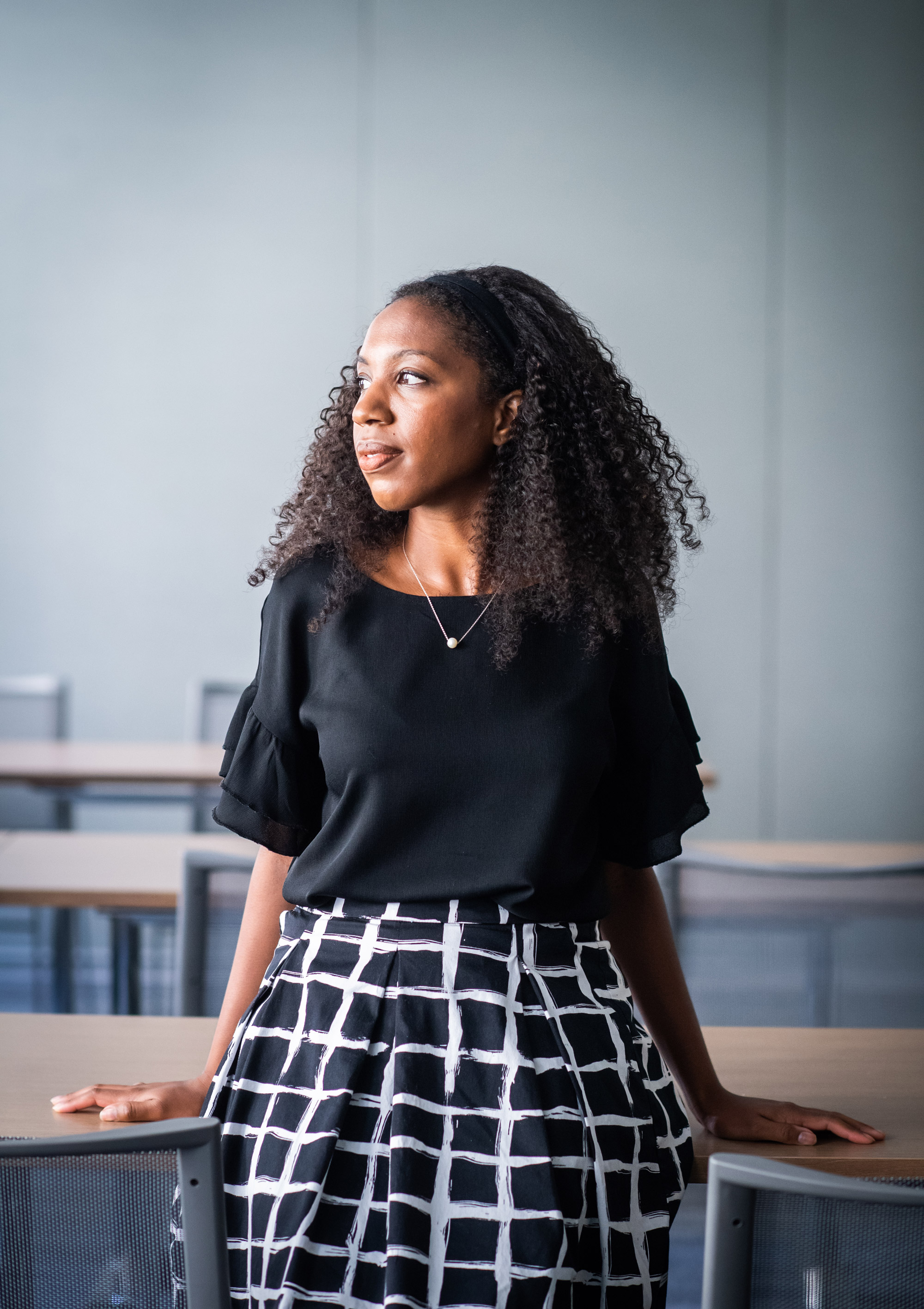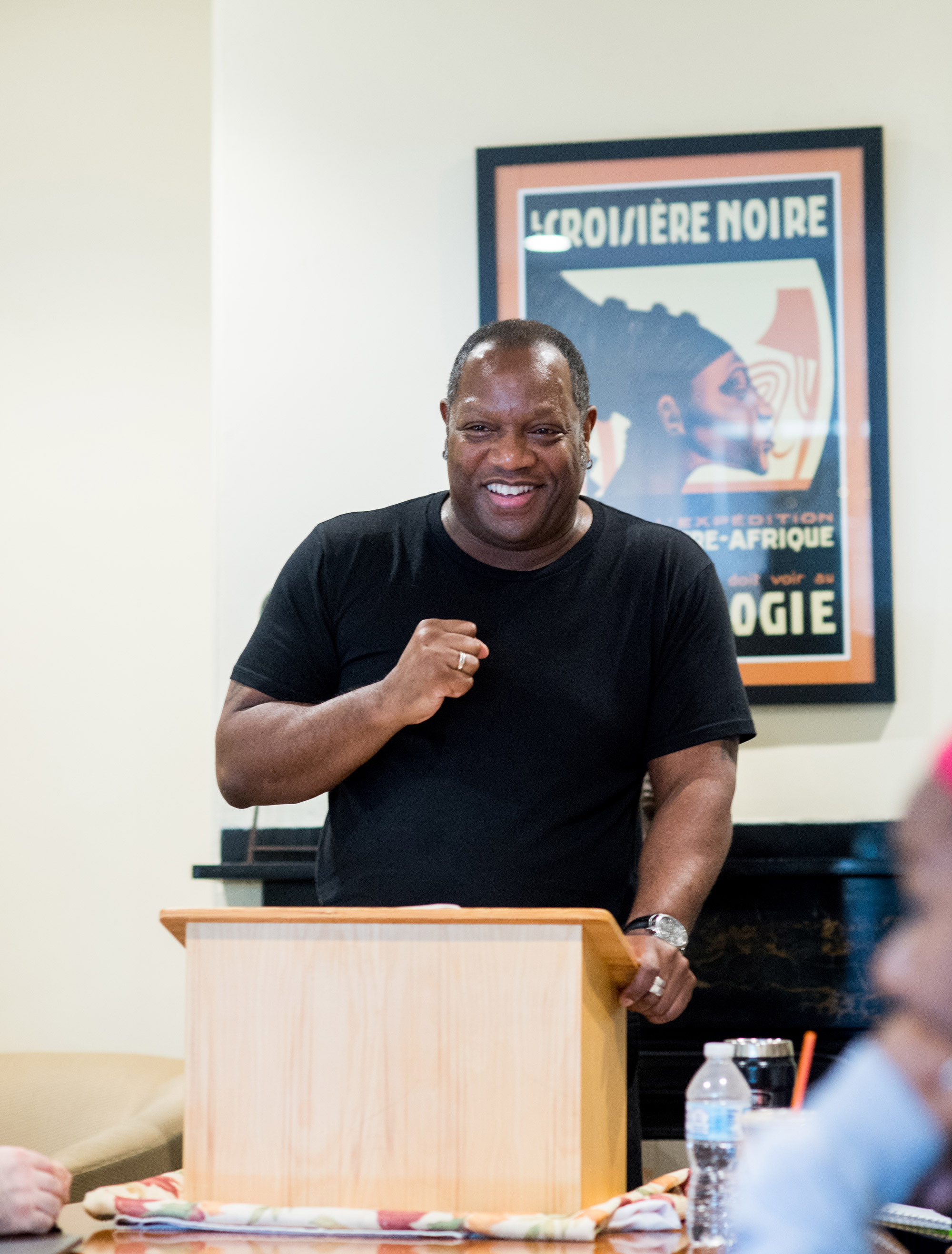African American Studies Program Turns 50

Undergraduates in and outside of the African American Studies Program take classes such as Black Thought: Literary and Cultural Criticism in the African Diaspora, taught by program director Louis Chude-Sokei (standing), George and Joyce Wein Chair in African American Studies and a College of Arts & Sciences professor of English. Photo by Cydney Scott
African American Studies Program Turns 50
Yearlong series of events highlights move from margin to center
At the time it was radical. Now, it’s fundamental.
On September 25, 1969, The News, then Boston University’s official newspaper, announced that the University would begin offering a Master of Arts in Afro-American studies.
“It can’t be stressed enough how radical an African American Studies Program was in 1969—the notion that the experiences and cultural products of African Americans and blacks worldwide spoke centrally to human experience and knowledge was bizarre and deeply threatening, as was the very idea that America was unknowable without its relationship to race and slavery,” says program director Louis Chude-Sokei, George and Joyce Wein Chair in African American Studies and a College of Arts & Sciences professor of English.
Now, Chude-Sokei notes, “African American Studies has moved from margin to center.”
The program is celebrating the 50th anniversary of that move with a series of events over the 2019-2020 academic year, beginning with a reception on Friday, September 20.
That first year, four students enrolled in the program. At the time, the country was still roiling from the assassination of Martin Luther King, Jr. (GRS’55, Hon.’59) the year before and the upheaval of the Civil Rights Movement and the Vietnam War. BU’s African American Studies Program, the country’s second oldest, is focused on all aspects of African American experiences and a broader look at race, immigration, culture, and politics.
It can’t be stressed enough how radical an African American Studies Program was in 1969—the notion that the experiences and cultural products of African Americans and blacks worldwide spoke centrally to human experience and knowledge production was bizarre and deeply threatening.
The original master’s program expanded in the mid-1980s to offer a minor to undergraduates, which this year has 16 students enrolled, with as many as 250 other undergrads taking the classes. As the program prepares to celebrate its 50th anniversary, Chude-Sokei says he hopes a major will also soon be offered in the undergraduate program and the small number of students in the one-year master’s program will be expanded. Both programs have been revamped and the faculty has grown; stepped-up recruiting is next.
The program’s distinguished alums include CBS News 60 Minutes correspondent Bill Whitaker (GRS’74) and former Suffolk County Juvenile Court Associate Justice Leslie Harris (GRS’74). Among the more recent graduates is Gabrielle Sims (CAS’15, GRS’16), who says her master’s in African American studies gave her the tools to succeed as the Boston Foundation program associate for neighborhoods and housing.
“I knew I was going to pursue a master’s, and I realized senior year that there were still things I wanted to learn about inequality, especially the piece about race,” says Sims, who focused on how and why neighborhoods change as an undergrad political science major. “The program gave me the rich understanding of history at each flashpoint in time.”

Sims says she’s also learned that making change is “a long game.”
She credits program faculty with giving her the skills necessary to work with housing advocates in her current position, and previously at Freedom House and NeighborWorks America, two other local nonprofits. “I learned how to ask questions to get the information I need and relationship-building techniques to create trust with the people you’re interviewing,” she says. “I use those skills every single day in philanthropy, as I’ve built out the anti-displacement strategy for the Boston Foundation.”
Program alum Carrolee Moore (GRS’14) is now director of partnerships at the nonprofit Alliance for Business Leadership in Boston, recruiting donors and encouraging community leaders to speak and lobby for progressive causes. She says the program helped her develop new ways of writing and thinking and a new understanding of the history of the African diaspora.
“It has really informed the way I view the world around me,” says Moore, who is pursuing a master’s in divinity from Gordon-Conwell Theological Seminary. “It has allowed me to see the world in a way that is not just from what is being talked about on CNN or Fox News, but being able to put it all into context. Which is invaluable when I find myself being the ‘teacher’ on topics around race in a lot of rooms I’m in.”
The anniversary celebration kicks off Friday with a Fall 2019 Welcome Reception at the African American Studies Program building. The event will include a moment of silence for Erin Edwards (COM’20), who was killed late last month at her home in Atlanta. Edwards took classes in the program and was a well-known figure around the building. The event is open to the public.
On Monday, November 4, there will be a reception honoring the program’s founder, the late Professor Emerita Adelaide Cromwell (Hon.’95), who died in June at age 99. She was a CAS professor of sociology when a student approached her in 1968 suggesting the establishment of an African American Studies Program. She pursued the idea with University administrators, and when the program launched, it was only the second of its kind in the United States (San Francisco State was the first) and the first to offer a graduate degree in the subject. Prominent alumni of the program will join friends of Cromwell’s to share memories at the event, which will be at the African American Studies building. A University-wide memorial service will be held the next day, November 5, at Marsh Chapel. Both reception and memorial service are open to the public.

“Given our political moment, the current relevance of African American studies is due to the foresight of its founders, who took such great risks, such as Dr. Cromwell,” Chude-Sokei says.
A daylong event on the question of reparations for slavery is scheduled for mid-February 2020. Lectures and panel discussions will focus on “the legacy, history, and need or lack thereof” for reparations, Chude-Sokei says, “and a broader conversation on the issue of restorative justice.” The topic is timely: several Democractic presidential candidates have recently addressed the issue of reparations.
Writing Black Lives, a symposium on March 27, 2020, will feature Jeffrey C. Stewart, winner of the National Book Award and the Pulitzer Prize for biography for The New Negro: The Life of Alain Locke (Oxford University Press, 2018), about the man known as the father of the Harlem Renaissance. Stewart will talk about the challenges he faced writing the book and more broadly, Chude-Sokei says, “what it means to write about black lives at this moment.” Other participants will include Carole Boyce Davies, a Cornell University professor of English and Africana studies and author of Left of Karl Marx: The Political Life of Black Communist Claudia Jones (Duke University Press, 2008), and Kerri Greenidge (GRS’09,’12), a Tufts University lecturer and codirector of the Tufts African American Trail Project, whose book, Trotter: Race and Politics in Boston (Norton), a biography of African American activist William Monroe Trotter, will be published this spring.
Chude-Sokei, editor-in-chief of The Black Scholar since 2014, is also hopeful that this year might see the journal officially move to BU. “It’s one of the oldest and leading journals of black thought in the United States and was founded the same year as BU’s African American Studies Program,” he says.
“Though we mourn Dr. Cromwell’s loss, it’s humbling to see the program begin manifesting her intentions for it,” Chude-Sokei says. “It’s also humbling to now witness glimpses of something even beyond all of our hopes and hard work.”
The African American Studies Fall 2019 Welcome Reception, celebrating the 50th anniversary of the program, is Friday, September 20, at the African American Studies Program, 138 Mountfort St., Brookline, from 5:30 to 7:30 pm. Refreshments will be served. The event is free and open to the public.

Comments & Discussion
Boston University moderates comments to facilitate an informed, substantive, civil conversation. Abusive, profane, self-promotional, misleading, incoherent or off-topic comments will be rejected. Moderators are staffed during regular business hours (EST) and can only accept comments written in English. Statistics or facts must include a citation or a link to the citation.